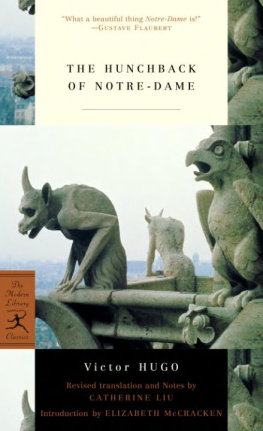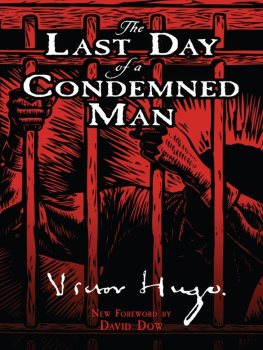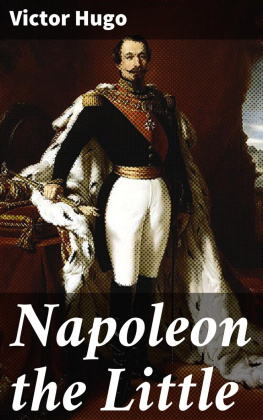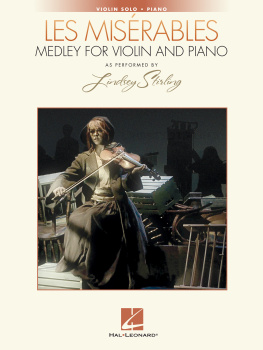Victor Hugo - Les Misérables
Here you can read online Victor Hugo - Les Misérables full text of the book (entire story) in english for free. Download pdf and epub, get meaning, cover and reviews about this ebook. year: 2008, genre: Art. Description of the work, (preface) as well as reviews are available. Best literature library LitArk.com created for fans of good reading and offers a wide selection of genres:
Romance novel
Science fiction
Adventure
Detective
Science
History
Home and family
Prose
Art
Politics
Computer
Non-fiction
Religion
Business
Children
Humor
Choose a favorite category and find really read worthwhile books. Enjoy immersion in the world of imagination, feel the emotions of the characters or learn something new for yourself, make an fascinating discovery.
- Book:Les Misérables
- Author:
- Genre:
- Year:2008
- Rating:5 / 5
- Favourites:Add to favourites
- Your mark:
- 100
- 1
- 2
- 3
- 4
- 5
Les Misérables: summary, description and annotation
We offer to read an annotation, description, summary or preface (depends on what the author of the book "Les Misérables" wrote himself). If you haven't found the necessary information about the book — write in the comments, we will try to find it.
Les Misérables — read online for free the complete book (whole text) full work
Below is the text of the book, divided by pages. System saving the place of the last page read, allows you to conveniently read the book "Les Misérables" online for free, without having to search again every time where you left off. Put a bookmark, and you can go to the page where you finished reading at any time.
Font size:
Interval:
Bookmark:
The Project Gutenberg EBook of Les Misrables, by Victor Hugo
This eBook is for the use of anyone anywhere at no cost and with
almost no restrictions whatsoever. You may copy it, give it away or
re-use it under the terms of the Project Gutenberg License included
with this eBook or online at www.gutenberg.org
Title: Les Misrables
Complete in Five Volumes
Author: Victor Hugo
Translator: Isabel F. Hapgood
Release Date: June 22, 2008 [EBook #135]
Last Updated: November 17, 2012
Language: English
*** START OF THIS PROJECT GUTENBERG EBOOK LES MISRABLES ***
Produced by Judith Boss and David Widger
No. 13, Astor Place
New York
Enlarge
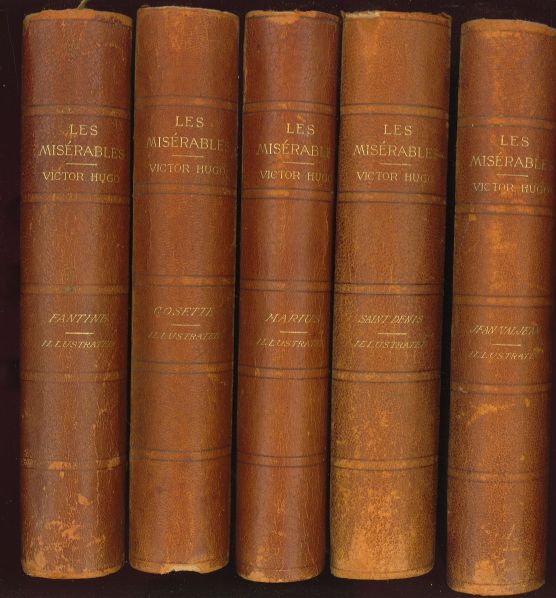
Enlarge
Enlarge

Enlarge
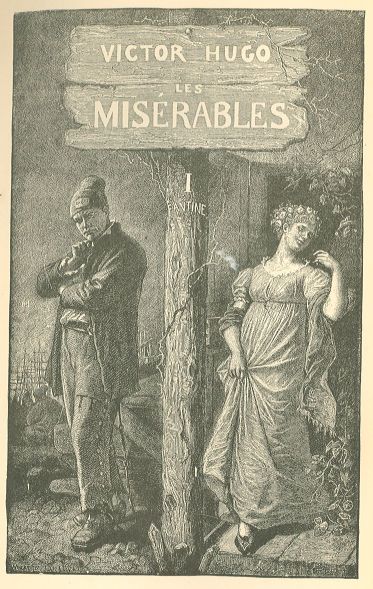
Enlarge
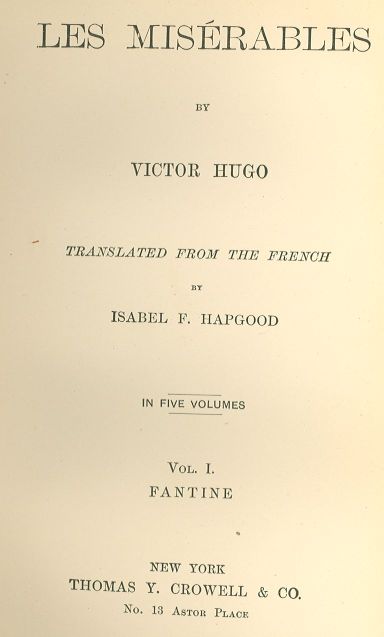
Enlarge
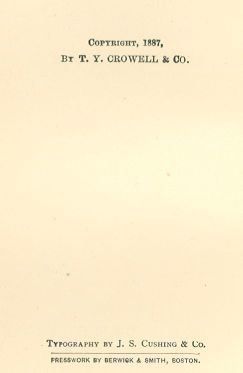
CHAPTER IIIN WHICH THE READER WILL PERUSE TWO VERSES, WHICH ARE OF THE DEVIL'S COMPOSITION, POSSIBLY CHAPTER IIITHE ANKLE-CHAIN MUST HAVE UNDERGONE A CERTAIN PREPARATORY MANIPULATION TO BE THUS BROKEN WITH A BLOW FROM A HAMMER CHAPTER VIIITHE UNPLEASANTNESS OF RECEIVING INTO ONE'S HOUSE A POOR MAN WHO MAY BE A RICH MAN CHAPTER XVIIN WHICH WILL BE FOUND THE WORDS TO AN ENGLISH AIR WHICH WAS IN FASHION IN 1832 CHAPTER VIMARIUS BECOMES PRACTICAL ONCE MORE TO THE EXTENT OF GIVING COSETTE HIS ADDRESS CHAPTER IXEMPLOYMENT OF THE OLD TALENTS OF A POACHER AND THAT INFALLIBLE MARKSMANSHIP WHICH INFLUENCED THE CONDEMNATION OF 1796 CHAPTER VIN THE CASE OF SAND AS IN THAT OF WOMAN, THERE IS A FINENESS WHICH IS TREACHEROUS CHAPTER IVMADEMOISELLE GILLENORMAND ENDS BY NO LONGER THINKING IT A BAD THING THAT M. FAUCHELEVENT SHOULD HAVE ENTERED WITH SOMETHING UNDER HIS ARM CHAPTER VITHE TWO OLD MEN DO EVERYTHING, EACH ONE AFTER HIS OWN FASHION, TO RENDER COSETTE HAPPY |
Bookshelf Bookcover Frontpapers Frontispiece Volume One Titlepage Volume One Titlepage Verso The Comfortor The Fall Awakened Cossette Sweeping Candlesticks Into the Fire Father Champmathieu on Trial Frontispiece Volume Two Titlepage Volume Two The Ship Orion, an Accident The Gorbeau Hovel The Black Hunt Javert on the Hunt The Resurrection Royalist Bank-note | Frontispiece Volume Three Titlepage Volume Three Little Gavroche Friends of the A B C Excellence of Misfortune Rose in Misery Red Hot Chisel Snatched up a Paving Stone Frontispiece Volume Four Titlepage Volume Four A Street Orator Code Table Succor from Below Cosette With Letter Slang The Grandeurs of Despair Frontispiece Volume Five Titlepage Volume Five Last Drop from the Cup The Twilight Decline Darkness |
So long as there shall exist, by virtue of law and custom, decrees of damnation pronounced by society, artificially creating hells amid the civilization of earth, and adding the element of human fate to divine destiny; so long as the three great problems of the centurythe degradation of man through pauperism, the corruption of woman through hunger, the crippling of children through lack of lightare unsolved; so long as social asphyxia is possible in any part of the world;in other words, and with a still wider significance, so long as ignorance and poverty exist on earth, books of the nature of Les Misrables cannot fail to be of use.
HAUTEVILLE HOUSE, 1862.
In 1815, M. Charles-Francois-Bienvenu Myriel was Bishop of D He was an old man of about seventy-five years of age; he had occupied the see of D since 1806.
Although this detail has no connection whatever with the real substance of what we are about to relate, it will not be superfluous, if merely for the sake of exactness in all points, to mention here the various rumors and remarks which had been in circulation about him from the very moment when he arrived in the diocese. True or false, that which is said of men often occupies as important a place in their lives, and above all in their destinies, as that which they do. M. Myriel was the son of a councillor of the Parliament of Aix; hence he belonged to the nobility of the bar. It was said that his father, destining him to be the heir of his own post, had married him at a very early age, eighteen or twenty, in accordance with a custom which is rather widely prevalent in parliamentary families. In spite of this marriage, however, it was said that Charles Myriel created a great deal of talk. He was well formed, though rather short in stature, elegant, graceful, intelligent; the whole of the first portion of his life had been devoted to the world and to gallantry.
The Revolution came; events succeeded each other with precipitation; the parliamentary families, decimated, pursued, hunted down, were dispersed. M. Charles Myriel emigrated to Italy at the very beginning of the Revolution. There his wife died of a malady of the chest, from which she had long suffered. He had no children. What took place next in the fate of M. Myriel? The ruin of the French society of the olden days, the fall of his own family, the tragic spectacles of '93, which were, perhaps, even more alarming to the emigrants who viewed them from a distance, with the magnifying powers of terror,did these cause the ideas of renunciation and solitude to germinate in him? Was he, in the midst of these distractions, these affections which absorbed his life, suddenly smitten with one of those mysterious and terrible blows which sometimes overwhelm, by striking to his heart, a man whom public catastrophes would not shake, by striking at his existence and his fortune? No one could have told: all that was known was, that when he returned from Italy he was a priest.
In 1804, M. Myriel was the Cur of B [Brignolles]. He was already advanced in years, and lived in a very retired manner.
About the epoch of the coronation, some petty affair connected with his curacyjust what, is not precisely knowntook him to Paris. Among other powerful persons to whom he went to solicit aid for his parishioners was M. le Cardinal Fesch. One day, when the Emperor had come to visit his uncle, the worthy Cur, who was waiting in the anteroom, found himself present when His Majesty passed. Napoleon, on finding himself observed with a certain curiosity by this old man, turned round and said abruptly:
Font size:
Interval:
Bookmark:
Similar books «Les Misérables»
Look at similar books to Les Misérables. We have selected literature similar in name and meaning in the hope of providing readers with more options to find new, interesting, not yet read works.
Discussion, reviews of the book Les Misérables and just readers' own opinions. Leave your comments, write what you think about the work, its meaning or the main characters. Specify what exactly you liked and what you didn't like, and why you think so.


